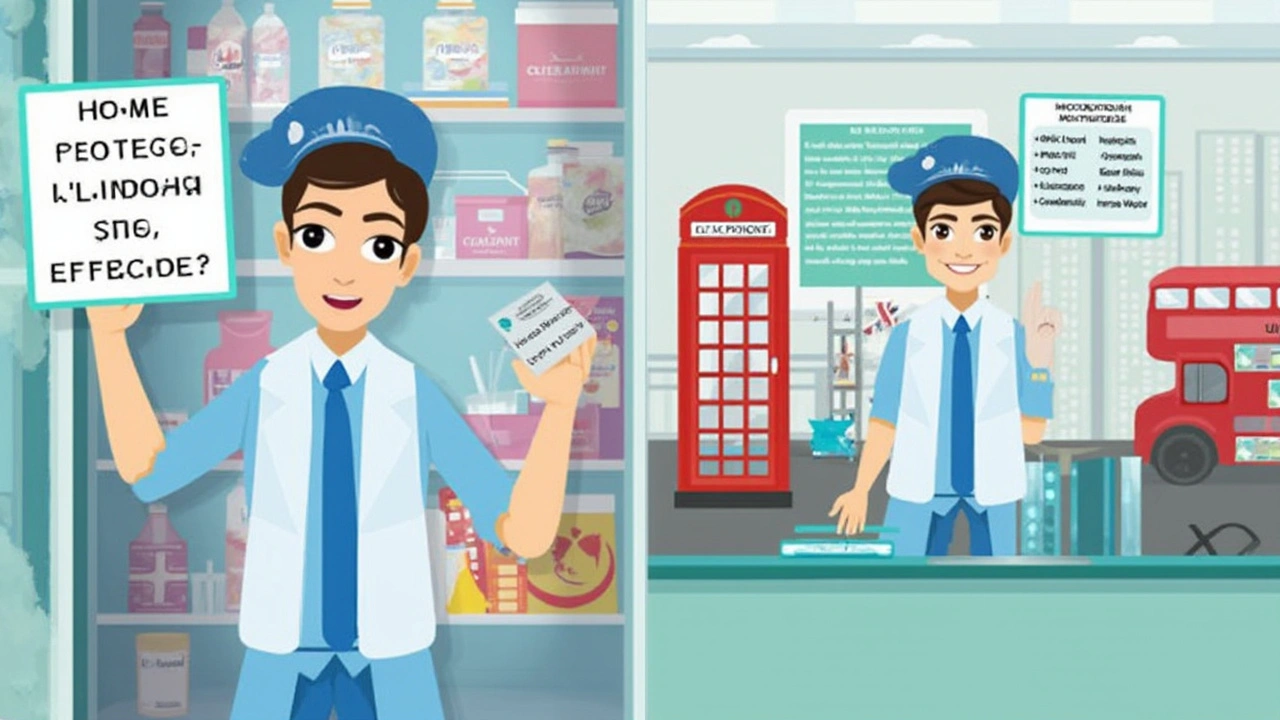Isosorbide Mononitrate and Other Medications: How Do They Stack Up?
 Apr, 24 2025
Apr, 24 2025
If you’ve ever felt that tight, aching pain in your chest and landed with a prescription for isosorbide mononitrate, you might be wondering how it actually helps. Or maybe your doctor’s weighing this pill against something like nitroglycerin, a beta blocker, or some whizzy new heart drug you can barely pronounce. It’s easy to get lost in a sea of names and options—especially when every choice can make a real difference to how you feel day-to-day.
Think of isosorbide mononitrate as an “opening up” medication for your blood vessels. It helps the heart not work so hard. It’s not the only kid on the block, though. There are different ways to treat chest pain, and each comes with its own set of tricks and little quirks. Picking one isn’t just about what works on paper—it has to work with your routine, your other pills, and your tolerance for side effects like headaches or dizziness.
Here, you’ll see what really makes isosorbide mononitrate tick, how it compares with the popular alternatives, and what to watch out for if it lands in your pill organizer. No fluff, just the info you wish your doctor had time to share.
- What Is Isosorbide Mononitrate?
- How It Works: The Science Made Simple
- Comparing Isosorbide Mononitrate to Other Heart Meds
- Tips for Taking Isosorbide Mononitrate Safely
- What to Watch For: Common Questions Answered
What Is Isosorbide Mononitrate?
Isosorbide mononitrate is a pill your doctor might give you if you have angina—that annoying chest pain that comes from your heart not getting enough blood. It belongs to a group called nitrates. Think of it as a cousin to nitroglycerin, but it sticks around in your system longer, so you don't have to pop a pill every time you get chest pain.
Instead, people usually take isosorbide mononitrate once or twice a day, not "as needed" like some fast-acting drugs. It’s mainly for folks who get angina often, helping prevent those episodes before they even start. That’s why it’s called a “maintenance” medication, not a quick fix.
This medication relaxes and widens the blood vessels, which makes it easier for the heart to pump blood. This means less work for your heart and fewer angina attacks. Here’s what sets it apart from some other heart medications:
- It doesn’t lower your heart rate—unlike beta blockers or calcium channel blockers.
- It won’t stop a heart attack; it’s for prevention.
- You don’t use it for immediate relief of chest pain. There are other meds for that, like nitroglycerin tablets.
You might spot it under brand names like Imdur or Monoket. Generics work just as well (and are usually cheaper).
If you’re curious about how common it is to take isosorbide mononitrate, here’s a quick look at some numbers from the National Center for Health Statistics for 2024:
| Condition | % of Patients Using Isosorbide Mononitrate |
|---|---|
| Chronic Angina | 68% |
| Heart Failure (Secondary Use) | 16% |
It’s not a miracle pill, but it’s wired into treatment plans for a lot of people managing angina day in and day out.
How It Works: The Science Made Simple
Isosorbide mononitrate is basically a helper for your blood vessels. When you take it, the pill releases something called nitric oxide. This stuff tells your blood vessel walls to relax and get a bit wider. Wider pipes mean your heart doesn’t have to push as hard to get blood moving through your body.
This is a game-changer for people with angina—or, as it’s commonly called, chest pain. By cutting down on the heart’s workload, isosorbide mononitrate reduces those little battles for oxygen that happen when your heart’s stressed out. It doesn’t fix blocked arteries, but it buys your heart some breathing room (literally!).
Here’s what’s going on in simple steps:
- You swallow the medication.
- It gets absorbed into your bloodstream.
- It triggers the blood vessels to widen (dilate).
- Your blood flows more freely, and your heart works less hard.
What makes isosorbide mononitrate a favorite over something like nitroglycerin? It lasts longer. Most people need to take it just once a day, so you’re less likely to miss a dose or have your symptoms sneak up on you at an awkward moment.
A quick data point: Studies show that taking isosorbide mononitrate daily can cut down the number of angina episodes by up to 65%. That’s a big deal when chest pain is slowing you down.
A few key details:
- It won’t stop a sudden angina attack. For that, you still need fast-acting meds like nitroglycerin.
- It works for prevention—not emergency rescue.
- No build-up in your system if you don’t take it regularly, so skipping doses isn’t safe.
If you’re wondering about daily life, this medication usually slips right into a breakfast routine. No fancy tricks. Just swallow and move on.

Comparing Isosorbide Mononitrate to Other Heart Meds
There’s a whole lineup of meds for angina and heart problems, and isosorbide mononitrate is only one player. So how does it stack up against the usual suspects? Here’s the scoop on some main options you’ll hear about at the pharmacy:
- Nitroglycerin (oral or patches): This is the famous fast-acting one. Doctors often use it for when chest pain hits out of nowhere. It works quick but doesn’t stick around long, so it’s not ideal for steady, daily prevention like isosorbide mononitrate.
- Beta Blockers (like metoprolol or atenolol): These don’t just help with chest pain—they slow your heart, lower blood pressure, and can even improve survival after a heart attack. Unlike isosorbide mononitrate, beta blockers can make you tired and drop your heart rate, but some folks do better with them.
- Calcium Channel Blockers (like amlodipine): These relax blood vessels too, and help both chest pain and high blood pressure. They don’t usually cause headaches like isosorbide mononitrate does, but swelling in the legs is a common tradeoff.
- Ranolazine: A newer player, this one changes how your heart uses energy. It’s usually added when other drugs aren’t enough. Fewer side effects, but it can mess with some other meds.
What sets isosorbide mononitrate apart is how it’s really meant for prevention. It lets you plan your day without worrying about that crushing chest pain popping up while you’re out walking the dog or hauling groceries. It’s usually taken once or twice a day and gives longer coverage than emergency nitroglycerin.
Here’s a quick look at how these meds compare for angina:
| Medication | Use | Speed | Common Side Effects |
|---|---|---|---|
| Isosorbide mononitrate | Prevention | Slow/Long | Headache, low blood pressure, dizziness |
| Nitroglycerin | Immediate relief | Fast/Short | Headache, flushing |
| Beta blockers | Prevention & after heart attack | Steady/Long | Tiredness, slow heart rate |
| Calcium channel blockers | Prevention & blood pressure | Steady/Long | Leg swelling, dizziness |
| Ranolazine | Add-on for tough angina | Steady/Long | Constipation, dizziness |
Here’s the tip: nobody gets the same results from every drug. Sometimes docs switch things up if side effects hit too hard or if you need more protection. If you ever feel like your isosorbide mononitrate isn’t cutting it, or you’re dealing with rough headaches, speak up. It’s all about finding the right combo for your heart and your day-to-day life.
Tips for Taking Isosorbide Mononitrate Safely
When it comes to isosorbide mononitrate, safety isn’t just about following the label. You want to make this med work for you while avoiding those common headaches or sudden drops in blood pressure. Here’s what you really need to know to stay on track and sidestep the major hiccups.
- Take it at the same time every day. This helps your body get in a rhythm. Most people take it in the morning, but if your doctor says otherwise, follow their plan.
- Don’t skip or double up on doses. If you forget a pill, just take it as soon as you remember—unless it’s almost time for the next one. Don’t “catch up” with two.
- Heads up on headaches. About 1 out of 4 folks get them, especially when starting. These headaches usually fade after a few days. If they get intense or won’t go away, let your doctor know.
- Get up slowly from sitting or lying down. Isosorbide mononitrate can make you a bit dizzy, especially after you’ve been still for a while. Standing up slowly can help prevent a head rush.
- Watch out for alcohol. Mixing booze with this medication can make dizziness and headaches worse. It’s best to go easy or skip the drinks until you know how you react.
- Don’t use erectile dysfunction meds with this drug. Combining isosorbide mononitrate with meds like sildenafil (Viagra), tadalafil (Cialis), or vardenafil (Levitra) can cause a dangerous drop in blood pressure. Always ask your doctor before mixing meds.
- Keep track of your symptoms. Is your chest pain getting better? Do you have more dizzy spells? Jot it down and bring your notes to doctor visits. Your provider needs to know what’s changing to adjust your treatment.
- Store your pills right. Heat and moisture can mess up your meds. Keep them in a cool, dry place—not the bathroom medicine cabinet.
If you ever notice fainting, severe chest pain that doesn’t ease up, or allergy signs like trouble breathing or swelling, call for help fast. Most people do fine on isosorbide mononitrate, but it pays to stay alert and keep communication open with your healthcare team.
| Side Effect | Chance (%) |
|---|---|
| Headache | 25 |
| Dizziness | 15 |
| Nausea | 7 |
| Low Blood Pressure | 5 |

What to Watch For: Common Questions Answered
It’s totally normal to have questions when starting a heart medication like isosorbide mononitrate. Let’s break down the most common stuff people wonder—or worry—about. Straight answers, no runaround.
- What side effects should I expect? Headaches pop up the most. In fact, about 50% of patients report some kind of headache, especially at first. Usually, it fades with time. Other common ones include feeling dizzy or lightheaded, especially if you stand up too fast. Super rare: fast heartbeat or nausea.
- Is it okay to mix with other meds? Be extra careful if you take drugs for erectile dysfunction or certain blood pressure meds. Mixing these can make your blood pressure drop dangerously low. Always double-check with your pharmacist or doctor. Keeping a current list of all your medicines helps a ton.
- Can I just stop taking it if I feel better? Quitting suddenly is a no-go. Your chest pain might come back stronger. If you ever want to stop or switch, talk it through with your doctor first.
- Why the timing of doses matters: This isn’t a “take whenever” pill. Isosorbide mononitrate only works well if you stick to the scheduled times—usually once or twice a day, same time. Skipping doses can mess with your angina control and bring back chest pain.
- Can I have a drink? Small amounts of alcohol might be okay for some people, but alcohol can add to the dizziness or cause big blood pressure swings. So, the safest answer is to limit booze and see how your body reacts.
| Side Effect | Isosorbide Mononitrate | Beta Blockers |
|---|---|---|
| Headache | Very Common | Rare |
| Dizziness | Common | Common |
| Fatigue | Uncommon | Very Common |
| Slow Heart Rate | Rare | Very Common |
Here’s a tip: Keep water handy, especially if you get headaches. Some folks also find taking the pill with food helps calm their stomachs.
Worried about the long-term? The British Heart Foundation says,
“Isosorbide mononitrate is safe and effective for people with angina, as long as it’s taken as prescribed.”
Just remember, if anything feels off—like a pounding heartbeat, pounding headache that won’t quit, or trouble breathing—call your doctor. Better to check and chill than push through something weird.

Matt Stone
July 18, 2025 AT 09:24Interesting read but I wonder why isosorbide mononitrate gets the nod often? From what I gather, it seems like it’s just a more convenient version of isosorbide dinitrate. The article mentions safety when mixing meds, that’s huge, but I didn’t see much on how it stacks up in effectiveness compared to others. Anyone here taken it and can share real-world results instead of clinical data? Also, what about the long-term benefits or downsides? Curious if it’s just hype or genuinely better.
Joy Luca
July 18, 2025 AT 11:14Yeah, I was expecting a deeper dive into the pharmacodynamics, especially how isosorbide mononitrate’s mechanism directly compares to nitroglycerin or beta-blockers. The content was a bit too surface-level for anyone with some medical background. Also, the side effect management section could have included more jargon to explain pathways and receptor interactions, but I guess simplicity has its merits.
Still, it feels like a missed chance to educate those who want more than just the basics.
Steven Macy
July 18, 2025 AT 12:14I appreciate the straightforward approach here. Sometimes medical info gets bogged down with terms nobody outside the field understands. It’s important for patients to know why a doctor chooses a specific drug. I think the article did a good job of explaining in a compassionate, accessible manner.
However, I’m curious about the anecdotes around side effects. From my family’s experience, managing headaches on nitrate meds is the toughest part. Does everyone experience this, or are there tips beyond hydration and dose timing?
Jessica Martins
July 18, 2025 AT 13:14The clarity was commendable, though I noticed a few minor grammar inconsistencies here and there that might distract some readers. Beyond that, I think the structure of the article helped maintain reader engagement, especially with the clear headings separating sections.
One aspect I would have liked expanded is the comparison chart with other heart meds. Visual aids help comprehension significantly.
Doug Farley
July 18, 2025 AT 14:14Oh wow, another heart med overview that sounds like a lullaby. "Simple facts, helpful advice"—yawn. The real kicker is that these drugs all basically do the same song and dance, just took a different label and a side of sugar coating. Like it really changes the world whether you have isosorbide mononitrate or just plain ol’ nitro when your ticker’s on the fritz? Pfft.
But hey, kudos for the safe mixing advice. Wouldn’t want anybody turning their heart meds into a chemistry experiment.
Jeremy Olson
July 18, 2025 AT 15:14I found the article a useful primer for patients newly introduced to heart meds like isosorbide mononitrate. It's clear in conveying why a physician might opt for this over alternatives, factoring in patient-specific variables. The emphasis on managing side effects is crucial, as compliance often falters due to adverse reactions.
It would be beneficial if follow-ups included patient testimonials or doctor interviews for a more comprehensive perspective.
Ada Lusardi
July 18, 2025 AT 16:14I've been on isosorbide mononitrate for a bit, and honestly, it’s a mixed bag. The article got the basics right, but the headaches really hit me hard sometimes 😣.
Also, mixing with other meds is scary. I'm always double-checking with my doc before adding anything new. Anyone got any go-to remedies for those pounding headaches that come with these meds? Any natural or non-drug options that worked?
Would love to hear your experiences ❤️.
Joe V
July 18, 2025 AT 17:14Classic article, ticks all the standard boxes. But let’s be honest, these meds don’t really 'stack up' as much as they just shuffle the deck. It’s all about personal tolerance and side effects management, not about groundbreaking effectiveness.
Still, folks need this kind of clear info if they want to make sense of prescriptions without their heads spinning. I’d only recommend maybe a more cynical take on the whole pharma game.
Calvin Smith
July 18, 2025 AT 18:14This piece lays down the essentials pretty well, but let's not sugarcoat it too much. Isosorbide mononitrate might be the lesser evil compared to some of the heart meds, but the side effects are no joke. Nitrate tolerance and stubborn headaches can turn the meds into an endless circus.
That said, the straightforward tips for side effect management are gold. It’s the kind of info that can make or break your daily battle with the script. Anyone else had a wild ride with this med?
Brenda Hampton
July 18, 2025 AT 19:14Reading this, I’m left wondering about the newer meds coming out for heart conditions. How does isosorbide mononitrate compare to those cutting-edge options in terms of patient outcomes and side effect profiles? The article didn’t touch on that much.
Also, are there any efficiency or adherence studies that might show why doctors prefer this nitrate over alternatives? The practical side of patient compliance fascinates me.
Scott Davis
July 18, 2025 AT 20:14Good overview. I appreciate it being simple and clear. The article made me feel like there's a reason behind choosing isosorbide mononitrate, not just random prescription.
Still, I agree it would be nice to see more on how side effects can be tackled beyond basic advice, like personal strategies or tips.
Steven Macy
July 18, 2025 AT 21:14Following up on the headache discussion, I read somewhere that taking the medication with food might help reduce the intensity for some people. Also, timing doses to avoid driving or work might be a practical tip for managing side effects. Has anyone tried these approaches?
Personal experiences always add more practical insight than general advice.